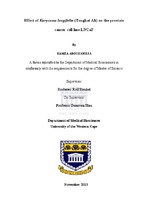Effect of Eurycoma longifolia (Tongkat Ali) on the prostate cancer cell line LNCaP
Abstract
Eurycoma Longfolia Jack, also known as Tongkat Ali (TA) is a tropical plant
belonging to the family of Simaroubaceae is widely distributed in South East Asian countries. The extracts of TA have been proven to have cytotoxicity, anti-proliferative and aphrodisiac properties. In vitro assays revealed cytotoxicity toward human breast cancer cell lines MCF-7, KB, CaOV-3, RD, DU-145and HepG2 human liver cancer cells and appear promising as a new chemotherapeutic agent against human cervical carcinoma (HeLa) cells. Although, there are extensive studies reported on its cytotoxicity benefits there are none pertaining to LNCaP human prostate cell line. Therefore, this study aimed at testing the effects of TA on LNCaP cells and prostate
specific antigen (PSA) production. Materials and Methods This study investigated the effect of different concentrations of TA (0.0025, 0.025,
2.5, 25 and 250 g/ml) TA on LNCaP human prostate cancer cell line for 24 and 96 hours. The following parameters were investigated: morphology, cell viability (MTT), testosterone modulation, Annexin V-CY3 binding (Apoptosis), DNA fragmentation (TUNEL), caspase 3/7 activity (apoptosis), and PSA production. Results When observing the morphological changes of LNCaP cells exposed to TA, a clear increase in detachment and cell death via apoptosis as the concentrations of TA increased. The viability decreased significantly in both 24 and 96 hour treatment of TA at higher dosages (25 and 250 g/ml). The significant inhibitory effects on testosterone stimulated cell proliferation were seen at TA concentrations as low as
0.0025 μg/ml TA. At higher concentrations of TA (25 and 250 μg/ml), for all
testosterone dosages a decreasing trend in proliferation was found.
vii Testosterone concentrations of 10 nM showed maximum stimulation of cell proliferation for TA dosages up to 2.5 μg/ml. All concentrations of TA showed significant increase in apoptosis of the cells as dosages increased.
A higher amount of DNA damage found at the highest dosage (250 μg/ml) of TA. The relative caspase 3/7 activation showed significant (P=0.0043) activation at the highest concentration (250 μg/ml) of TA. Relative PSA production resulted only a 5% increase with no significant difference at all doses indicting that TA does not change the cell PSA production and the decline in PSA concentration is due to LNCaP cells dying as a result of this exposure to TA. Conclusion In summary, the major finding of this study is that Tongkat Ali inhibits the viability of prostate cancer cell lines (LNCaP) through caspase-mediated pathway, as well as increased the level of apoptotic such as DNA fragmentation. In addition, Tongkat Alin also inhibited PSA production. In LNCaP cells, testosterone with the addition of TA does not increase the growth of the cells. However, more in-vitro and in-vivo studies are needed to establish the exact constituents of the extracts and their mechanism of action. Thus, this study opens perspectives on the use of Tongkat Ali preparations in the treatment of aging male symptoms, prostate cancer prevention or as additional treatment to standard prostate cancer therapy.

